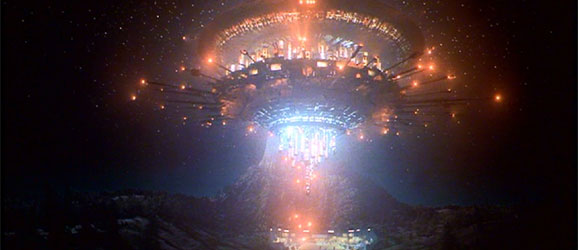What Would Religion Do If We Discovered Alien Life?
This article is more than 2 years old

The religion vs. science debate has been going on for centuries. Can both exist? Is there a place for religion if there is science? Questions like these began popping up the moment Galileo started observing the stars for an explanation of our existence. From that moment, science put religion in doubt and that doubt only got bigger and bigger.
Senior writer for Science.com Mark Wall recently attended the SETICon II conference in Santa Clara, CA and went to a panel discussion with panelist Doug Vakoch and Seth Shostak, along with award-winning Canadian science fiction author Robert J. Sawyer called “Would Discovering ET Destroy Earth’s Religions?”
The panel ultimately came to the conclusion that if alien life made contact with Earth, it would most likely not shatter people’s religious beliefs. It would probably strengthen them. Throughout history, even in Galileo’s time, religion grew in numbers when scientific fact was first introduced. The idea of Creationism and the one true God have been decaying since science has become more prevalent in the world but people still hold to their beliefs in these models.
Mark Wall accounts in his piece…
The Bible, Koran and other sacred texts of the world’s major religions stress God’s special concern for humanity and for Earth. So the discovery of aliens — microbes on Mars, say, or signals from an intelligent civilization in another solar system — might seem threatening, by implying that we and our planet aren’t all that special.
But our species has had plenty of time to get used to this idea. Nicolaus Copernicus made perhaps the first powerful case for it in 1543, when his seminal work “On the Revolutions of the Celestial Spheres” showed that Earth revolves around the sun, rather than the other way around.
“We haven’t been the center of the universe for a while now — four centuries,” said panelist Seth Shostak, a senior astronomer at the SETI Institute.
People who are firm in their religious beliefs are not shaken by scientific discoveries that may answer the origins of life and our existence. The example of Charles Darwin’s theory of evolution is the explanation for the basis of modern science and biology. Despite the evidence of Darwinism, religious beliefs keep marching on and are arguably stronger than they have ever been since the theory’s introduction over 150 years ago.
The Director of Interstellar Message Composition at the SETI Institute, Doug Vakoch points out, Baptist theologian Dr. Ostrander’s thoughts on the idea of life on other planets…
Dr. Ostrander is adamantly opposed to evolution, and yet he has no problem with the idea of there being extraterrestrials. He says it’s as if a couple has one child, and then they decide to have a second child. Is that second child any less special? So too if God decides to have life on our planet, and then another planet, and another planet. It doesn’t make us less special.
These are questions science fiction takes very seriously. It’s the subject of great works like Stanley Kubrick’s 2001: A Space Odyssey and Robert Zemeckis’ Contact. Science and religion have already proven that both can co-exist.












